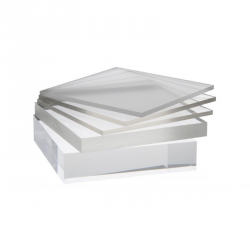Is it Lucite? Is it Acrylic? Does it matter? The terms (and materials) Lucite and Acrylic may be used interchangeably, but there are some differences. Here, we discuss those key differences and why you may choose Lucite vs acrylic in certain use cases.
What is the Difference Between Lucite and Acrylic?
Lucite vs acrylic: What’s the difference? Before we discuss the differences, let’s first discuss how they are the same. They are both transparent, durable, and shatter resistant. And they are both made from a synthetic polymer called polymethyl methacrylate (PMMA).
The difference? Lucite is a trademark name of PMMA. Developed and manufactured by Dupont in the 1930s, it is now manufactured by Lucite International. There are other acrylics that go by their branded name, such as Plexiglas and Acrylite to name a few. Think of acrylic as the generic name. So, Lucite is an acrylic while acrylic is not Lucite.

Qualities of Lucite vs Acrylic
Both Lucite and acrylic have high optical clarity, but again, they share many similarities since they are both PMMA. But there are few differences. Here’s how they shake out.
- Clarity — Both Lucite and acrylic have high optical clarity, however Lucite has a slightly higher refractive index, which makes it appear clearer and brighter
- UV resistance — Lucite is slightly more resistant to UV light than acrylic
- Limited yellowing – both Lucite and acrylic maintain their transparency as they age without excessive yellowing
- Chemical resistance — Lucite is more resistant to certain chemicals (i.e., alcohol and some cleaning agents)
- Cost – Whether Lucite or acrylic is fabricated in cast or extruded forms, it is less expensive and more durable than glass
- Easy maintenance – A wet microfiber cloth may be all that’s needed to clean PMMA, but when cleaning and maintaining Lucite or acrylic, the easiest and safest measure is to use soapy water or Novus products.
- More scratch-resistance – Compared to glass and other plastics, such as polycarbonate, acrylic (including Lucite) is less likely to scratch. And when it does get scratched, it can possibly be polished/buffed out. Try that with glass!
Lucite and Acrylic Use Cases
Lucite and acrylic are often used as a replacement for glass due to their shatter resistant properties. Here are few common use cases for Lucite and acrylic:
Lucite
- Furniture. It’s durable and fashionable(and easy to clean). What more do you want from a piece of furniture? Think coffee tables, nightstands, lamps, chairs, etc.
- Jewelry. While Lucite is a strong material, it is able to be hand-carved without breaking or cracking. This makes for a versatile material for crafting jewelry.
- Automotive – The durability and superb clarity of Lucite lends itself to automobile headlight covers.
Acrylic
- Accessories – Acrylic phone cases (and screen protectors) come to mind, but clear desk accessories are also trendy and functional accessories for the home or office.
- Safety shields – From bullet-resistant shields to office partitions to sneeze guards, acrylic provides safety without limiting visibility.
- Signage – acrylic signs and sign holders are durable and stand up to heavy use, such as holding table menus at a restaurant or displaying retail signage outdoors.
- Display cases – Retailers can show off merchandise while protecting it with cabinets with acrylic windows. Acrylic is also a lightweight (and lower cost) material to create point of purchase displays.
- Aquariums – Acrylic’s low water absorption, impact resistance, and optical properties make it a great material for aquariums.
- Picture frames – Acrylic’s UV resistant properties protect artwork or documents from UV rays, thanks to acrylic’s UV resistant properties.
- Roof panels – Using acrylic is a durable material to use on structures such as pergolas. They are weather- and UV-resistant, and won’t yellow from the sun. They are also lighter than glass which makes installation easier.
- Windows – Windows made from acrylic instead of glass offer protection from projectiles—an important consideration if the structure is near a golf course or baseball diamond.
Final Thoughts
Unsure whether Lucite vs acrylic is best for your needs? Talk to our sales professionals for additional information. Acme Plastics carries acrylic sheets from Lucite, Plexiglas, Acrylite, Plaskolite Optix, Polycast and Chemcast in a variety of sizes, including 80″ x 120″ boards & panels. Acme Plastics offers acrylic in rods, tubes, and mirrors as well.

